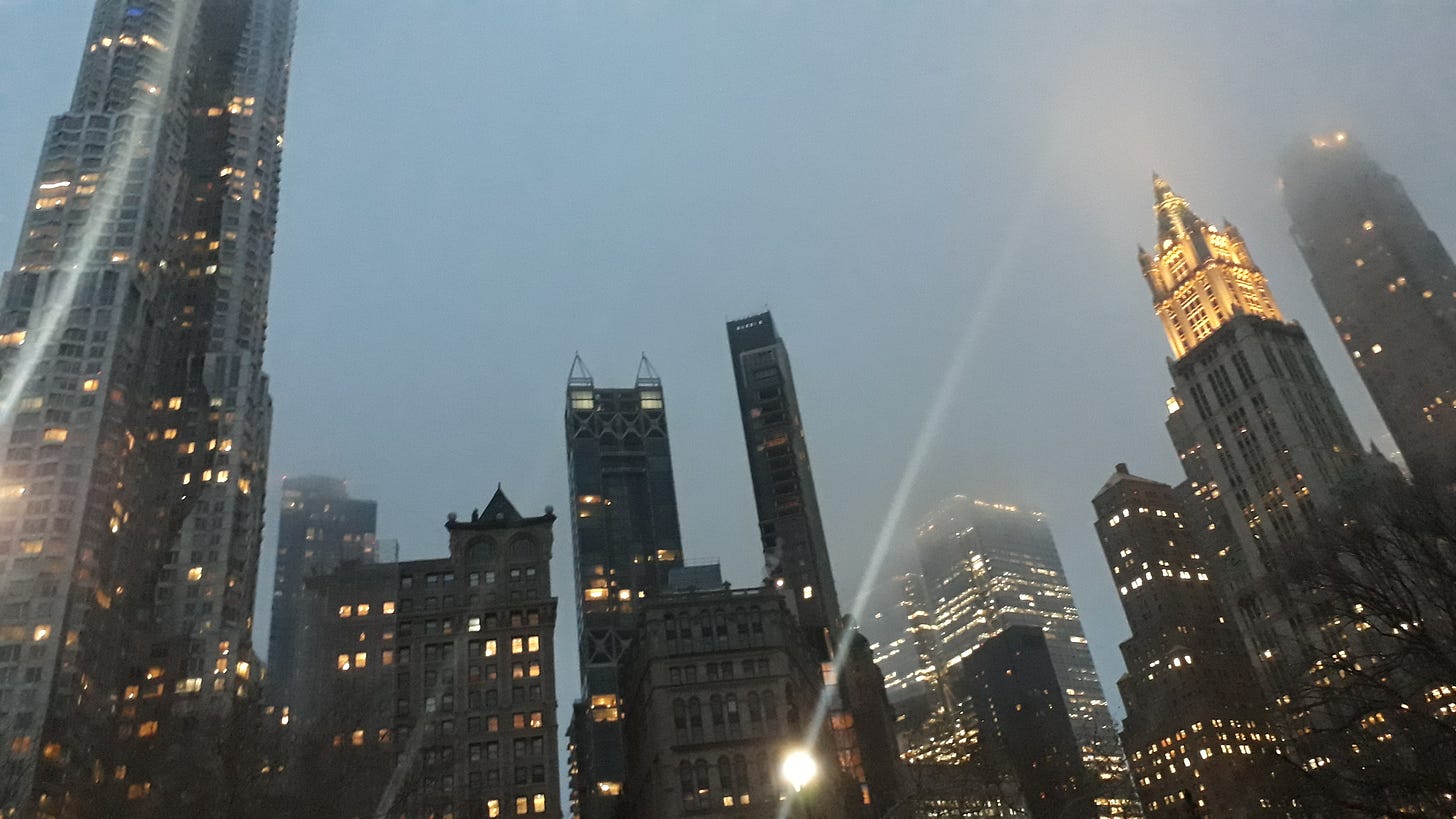Back in New York, passing Wall Street this evening, I saw a homeless man outside the stock exchange. Homeless people have always been a feature of every place I’ve ever been in the United States, particularly New York, but this evening I was struck by the thought that when I first spent any length of time in the US - about fifteen years ago - a homeless person outside the New York Stock Exchange would have felt like some sort of powerful metaphor of something, whereas now it’s almost what I expect to see.
In the first weeks of the Ukraine war, when images circulated of Ukrainians using the Kiev metro for shelter, I couldn’t help but feel a comparison with the New York subway, which - like most of the limited public transport in the United States - is frequently - and with increasing controversy - also a shelter for homeless people.
It was apparent that, despite the conditions and chaos of warfare Ukrainians were forced to endure, both public transport systems were coming to represent places of shelter for those in need. The scenes of the Kiev metro were, if anything and despite the war, by some margin more orderly, sanitary and generally amenable than those in New York.
I would never press too hard at the point that the economic violence of neoliberal capitalism is akin to the actual violence of warfare. To do so is to be callous with the victims of war, the wrongness of war, and the need to insist - against the tendency of postmodernism to relativise trauma and make everything into a shade of something else - that some things are not the same as others, and the integrity of the body and its right to freedom from pain and coercion are sacred and paramount.
Nonetheless, when you see people driven, at the same moment in history, to shelter in subways from war, or to shelter in subways from homelessness, it is hard not to sense some sort of likeness by which the force of poverty and destitution at work in the United States is - if not as physically impacting as war and bombardment - nonetheless similarly unforgiving, and perhaps - for all that war is senseless - in many ways harder to understand.
New York City has a new train station; Moynihan, an extension to Penn Station. While many New York subway stations are having benches removed to deter homeless people from sheltering in them, Moynihan has been purpose-built without such opportunities to begin with.
There is a separate question to be had about the inhumanity or otherwise of this. Public transport is an essential public service and a vital public good; it shouldn’t have to multitask as the - also essential - public service of providing care and accommodation for the unwell and the destitute, while at the same time providing the necessity of mobility.
As interesting as this, however, seems to be the growing irritation of altogether more bourgeois New Yorkers at the absence of basic amenities such as a bench or a place to sit within a public transport system.
Something in this seems significant, and telling of the direction from which change feels more likely to come in the United States, as working and middle-class people come to realise that their country is one in which even they will not be afforded the basic provision of a bench, because all around is such destitution that to provide such a thing would be more social problem than solution. At some point there crystallises the realisation that everyone is going down together.
This morning I sat outside a cafe in Brooklyn I go to often. At a wooden bench beside my table was a man I haven’t seen before, who I think was partially-sighted, and perhaps not entirely well, though moderately so by even local standards. He mostly kept to himself and simply rocked back and forth on the bench where he sat, its wooden joints creaking slightly.
Half-heartedly, as if realising that he probably should, now and then as someone passed on the street, he would ask for a dollar, sometimes not even completing the sentence because - perhaps - he didn’t entirely need the dollar and - perhaps - nobody carries cash any more anyway.
After a while, a familiar man came by, someone who regularly appears and shuffles between people and asks in a voice that is - from either some impediment or medication - high-pitched and slow, if people can spare some change. His words are always the same, always slightly stretched: “Good morning, spare some change?”
This morning, as always, he worked his way between a couple of tables, asking for change as he does, before shuffling to the partially-sighted man on the wooden bench. There he stopped, realising that he was now in front of someone probably of the same position, or similar need, as his own.
“Good morning, sir” he said, slow and drawn as always, before he hesitated and obviously concluded to himself that the second part of his regular question was redundant here. He turned, and shuffled on.
“Hey”, called the man with the poor sight, who had scarcely asked any passers-by for money. “What you need?” he asked, as if mildly affronted at not being given the full request.
“spare some change?”, finished the second man, to which the first put his hand into an inside pocket, went in deep, pulled out one old and dirtied dollar, and handed it over.
In some ways I feel guilty to have noticed, still more enjoyed, and even more reproduced this scene. I suppose I only do so because in it people who society see fit mostly to ignore, so that even members of that same strata of society steadily learn or presume to ignore one another, will nonetheless insist on their right to be seen, and in it, their right to dignity, even in a society that denies it.




